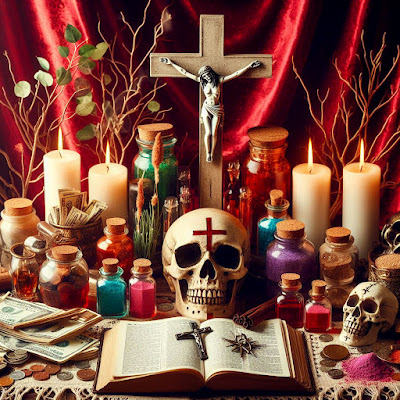Obeah in The Bahamas
Origins and Historical Context
Obeah originated from the African spiritual traditions brought to the Caribbean by enslaved Africans during the transatlantic slave trade. These traditions were diverse, as the enslaved people came from various ethnic groups across West and Central Africa, each with its own spiritual practices. Upon arriving in the Caribbean, these practices syncretized with each other and, in some cases, with elements of European and Indigenous beliefs, giving rise to unique forms of spiritual expression, including Obeah.
Obeah became particularly prominent in Jamaica, Trinidad, and the Bahamas. It was both a form of resistance against the oppressive conditions of slavery and a means of maintaining cultural identity. Enslaved people used Obeah to empower themselves, seeking protection, healing, and sometimes retribution against oppressors.
Obeah is characterized by its use of spells, charms, and rituals. Practitioners, known as Obeahmen or Obeahwomen, are believed to have the power to communicate with spirits and harness supernatural forces.
"Sister Zuri" - Bahamas AI art
Healing: Using herbs and natural remedies to treat illnesses and ailments. This aspect of Obeah involves extensive knowledge of local flora and its medicinal properties.
Protection: Creating protective charms and amulets to ward off evil spirits or harm.
Divination: Using methods like casting lots or interpreting dreams to gain insights into the future or uncover hidden truths.
Cursing: Placing curses or hexes on individuals as a form of retribution or to settle disputes.
The practice of Obeah is often shrouded in secrecy due to historical and ongoing legal and social stigmatization. It was criminalized in many Caribbean territories during the colonial period, and this criminalization persisted into the post-colonial era.
Obeah in the Caribbean Today
Obeah remains a controversial and often misunderstood aspect of Caribbean culture. In some areas, it is still practiced covertly due to its illegal status or social stigma. However, it continues to be an important cultural and spiritual practice for many.
The Bahamas and Obeah
In the Bahamas, Obeah has a significant historical presence. The British colonial government criminalized it in the 19th century, and these laws persisted long after independence. The Bahamian Obeah Act of 1898, for example, made it illegal to practice Obeah or to be in possession of Obeah paraphernalia.
Despite these legal restrictions, Obeah persisted as an underground practice. It was both feared and respected, with Obeahmen and Obeahwomen sought out for their perceived abilities to heal, protect, and influence outcomes.
Medicines and Remedies in Bahamian Obeah
Bahamian Obeah relies heavily on natural remedies derived from local plants. Some commonly used plants and their associated remedies include:
Cascarilla: Used for protection and purification rituals.
Guinea Hen Weed: Believed to have strong healing properties and used to treat various ailments.
Cerasee: Used for its purifying properties and to treat digestive issues.
Obeah Fixes
Some typical Obeah fixes or remedies include:
Protection Baths: Herbal baths prepared with protective herbs to cleanse the body of negative energies.
Love Spells: Charms or potions intended to attract love or enhance affection between partners.
Curative Potions: Herbal concoctions designed to cure specific illnesses or ailments, often tailored to the individual’s needs.
Cat Island Connection
Obeah has long been part of Cat Island’s identity in The Bahamas, where stories about healers, charm-makers, and spiritual guides have been passed down for generations. The island’s hills and small settlements are full of folklore about people who could cure illnesses, protect families, or settle disputes through spiritual means. Some residents see Obeah as a cultural tradition tied to African ancestry and practical survival in isolated communities, while others view it more cautiously, as something whispered about but rarely discussed openly. Either way, Cat Island is often the place people mention when they talk about Obeah in the Bahamian islands, giving it a reputation that blends history, mystery, and community memory.
Obeah, despite its controversial status, remains a vibrant and integral part of Caribbean cultural heritage. Its roots in African spiritual traditions underscore its significance as a means of cultural preservation and resistance. In the Bahamas, as in other parts of the Caribbean, Obeah continues to be practiced, offering a glimpse into the enduring power of traditional belief systems in the face of modernity and legal suppression. Understanding Obeah requires a nuanced appreciation of its historical context, its practical applications, and its ongoing role in Caribbean societies.



